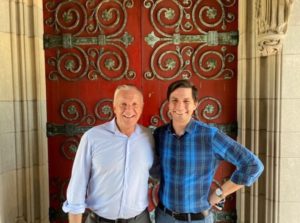News
A Message from The Rev. Dan Kline
In our first reading for this coming Sunday, the Deuteronomistic history sums up the transition of power from King David to King Solomon in one neatly packed sentence: “So Solomon sat on the throne of his father David; and his kingdom was firmly established” [emphasis added]. While we are dealing with the priesthood and not a monarchy, the same holds true for us at St. Paul’s. This Sunday is not the formal installation (equivalent to a coronation ceremony in many respects), but it is the first Sunday of our new rector. Power and responsibilities have been transferred and the kingdom has been firmly established, through the work of the interim ministry period and a long tradition of peaceful succession.
 One of the things I love about the Episcopal Church is our policies and procedures. I know that’s not as exciting as new membership or a stunning piece of choral music, or even a theological treatise, but it is an important part of how we understand who we are as individual Christians and who we are together as the body of Christ. In our church, our chief spiritual leaders are tenured. Churches go through an interim period to do some self-reflection, have time for a search for the right kind of leader for the next phase of the life of the institution, and to make any necessary adjustments that will help the new leader’s landing to be a smooth success as they will be here for a long time. In other words, the job of the interim period is to firmly establish the kingdom. Our policies and procedures are designed to help see the hand off from one leader to the next happen without a hitch.
One of the things I love about the Episcopal Church is our policies and procedures. I know that’s not as exciting as new membership or a stunning piece of choral music, or even a theological treatise, but it is an important part of how we understand who we are as individual Christians and who we are together as the body of Christ. In our church, our chief spiritual leaders are tenured. Churches go through an interim period to do some self-reflection, have time for a search for the right kind of leader for the next phase of the life of the institution, and to make any necessary adjustments that will help the new leader’s landing to be a smooth success as they will be here for a long time. In other words, the job of the interim period is to firmly establish the kingdom. Our policies and procedures are designed to help see the hand off from one leader to the next happen without a hitch.
This does not mean that there will not be challenges in the coming days. King Solomon had to contend with Adonijah (David’s other son), Joab (David’s general), Abiathar (David’s priest), and Shimei (David’s enemy) as he consolidated his reign. It was not until after dealing with these potential rivals to the throne, a marriage to the daughter of Pharaoh, one of the major political players of the era, and a dream where God granted Solomon that proverbial wisdom that his kingdom was considered established. The interim period continues in a way through the first several months (some say year) of new leadership. Staff changes happen, ways of running operations may shift, and renewed vision will begin to take shape. All of these things are a normal part of “the plan.”
It will also be normal to ask questions. Anytime we encounter something new or outside of our paradigm, we are prone to wonder. “How can this man give us his flesh to eat?” the crowd asks in our Gospel. “Who can govern this, your great people?” Solomon asks. So we must ask questions. But we should be expected to be surprised by the answers. Bread that can make us live forever? A boy king wiser than any other ruler in history? Drunk with joy from the Holy Spirit with loud songs? Wisdom looks much different than what we expect and the answer to our question sometimes feels like an answer to a question we weren’t asking in the first place. That’s how far afield the right answer can be to the question we are asking when we are in line with the Holy Spirit of wisdom.
“So do not be foolish, but understand what the will of the Lord is.” The Episcopal way of doing things may have seemed strange these past few years, but it has brought us to this moment. We have our new rector, Fr. Eric Hungerford, who has been prepared, called, and empowered to lead us into the next chapter of our life together. Let us respond with good questions, openness to surprising answers, and great joy with gratitude and praise. We may find that we and our children and our children’s children will be able to call St. Paul’s a place of healing, guidance, and love for many generations to come.
